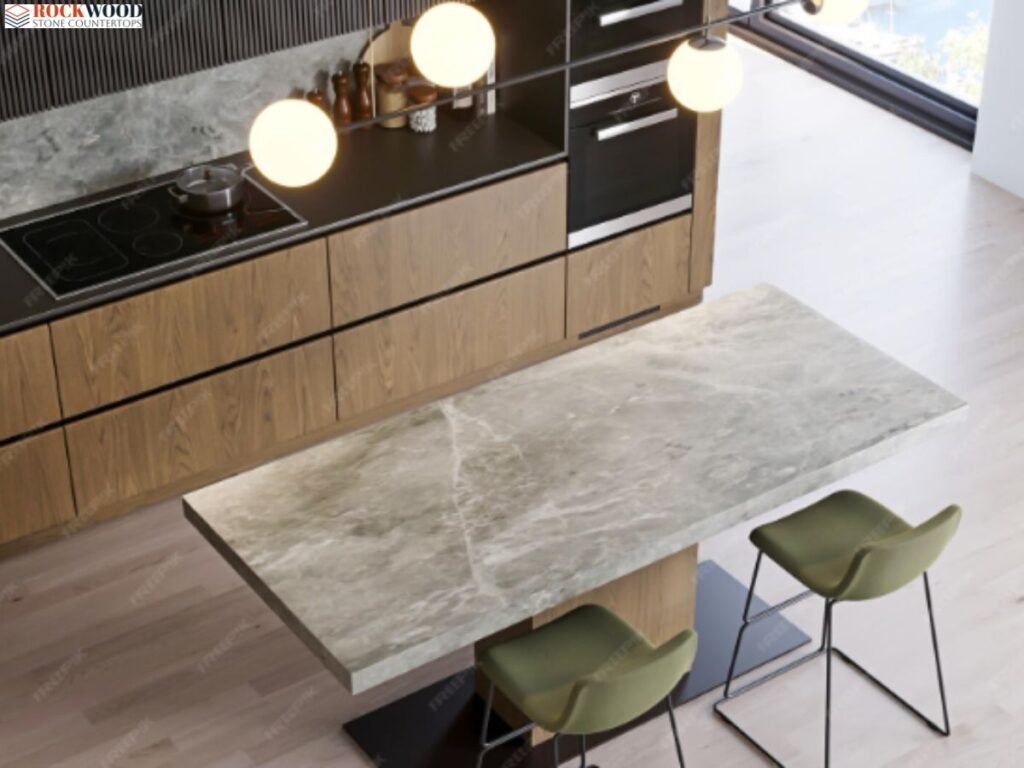Table of Contents
Considering porcelain countertops in Winnipeg for your next kitchen or bathroom design? There is a lot of curiosity among the homeowners about whether porcelain tile is strong and fashionable enough to withstand the daily use of the tiles in the real houses. So what do the pros really think—and is it a good idea to install it in your home in Manitoba?

Why more winnipeg homes are going porcelain
Porcelain tile can now be used on the wall and the floor. It is starting to look like a real choice in terms of kitchen and bathroom countertops. Does it actually resist heat, stains, and rough use?
So without further ado, let us get down to the facts and the endorsements of experts, including real tips to see you through.
What Makes Porcelain Different from Regular Tile?
The porcelain tile is heated to very high temperatures and thus is denser and non-porous as compared to the ceramic tile. It uses filtered clay and minerals such as feldspar and quartz, so it is strong and smooth.
Here’s how porcelain compares to other materials:
- Less porous than ceramic—resists moisture better
- More heat resistant than laminate
- Lighter than natural stone like granite or quartz
- Can mimic marble, granite, or concrete looks
- Comes in large slab formats (not just tiles)
Pro Tip: Porcelain slabs are now available in jumbo sizes up to 10 feet, meaning fewer seams for a cleaner finish.
Is Porcelain Durable Enough for Countertops?
Yes—but only if you choose the right type and install it properly.
Porcelain is extremely hard. It scores 7 out of 10 on the Mohs hardness scale, just below quartz and well above marble. It resists scratching from knives, keys, and pots. That said, it can chip if hit on the edges with something heavy.
Key durability facts:
- Heat resistance: Can handle up to 800°C
- Water absorption rate: Less than 0.5%
- Stain resistance: High, even with wine or coffee
- Scratch resistance: Excellent for normal use
Can You Use Porcelain Tile Instead of Porcelain Slabs?
Technically, yes—but there are trade-offs.
Pros of using porcelain tiles:
- Cheaper upfront
- Easier to transport
- More local availability
Cons:
- More grout lines (harder to clean)
- Doesn’t look seamless
- Lower resale value compared to slabs
If you’re seeking a contemporary, non-seam look with the lowest maintenance, then go for porcelain slabs instead of tiles.
What happens during a Porcelain Countertop Installation?
Porcelain tile installation is a job not for the do-it-yourselfer. It is like delicate glassing and requires specialised tools and methods because it is so thin and brittle till it’s fully supported.
Step-by-step overview:
- Measure the space accurately
- Cut the slab using a water-cooled bridge saw
- Apply adhesive to the cabinet surface
- Set slab gently in place
- Seal joints and edges
- Let cure for 24-48 hours
Important Tip: Always hire trained porcelain fabricators for the job.
What Are the Design Options?
Porcelain is incredibly versatile in design. It can mimic:
- White marble with grey veining
- Concrete finishes for modern kitchens
- Black stone looks for high contrast
- Textured stone patterns for rustic charm
You can even choose matte, satin, or polished finishes based on the room style.
How to Maintain Porcelain Countertops
Porcelain requires very low maintenance. Here’s a simple routine:
- Wipe spills with a damp cloth
- Use mild soap for daily cleaning
- Avoid abrasive pads
- No sealing required
- Avoid dropping heavy pots on corners
Maintenance cost? Almost zero.
Who Should Consider Porcelain Countertops?
Porcelain countertops are ideal for:
- Families who cook daily
- Homeowners who want a modern, clean look
- People who want easy maintenance
- Budget-conscious renovations
- Homes with outdoor kitchen areas
Why Winnipeg Homeowners Trust Porcelain for Kitchens
Winnipeg’s climate can be harsh, with cold winters and hot summers. Porcelain stands up to temperature changes better than wood or laminate. It doesn’t warp, crack, or absorb moisture.
It’s also great for:
- Humidity resistance in bathrooms
- Cleanliness in kitchen prep zones
- UV resistance for sun-exposed rooms
Fact: Porcelain’s water absorption is less than 0.5%, meaning it’s nearly waterproof.
Real Winnipeg Homeowners Share Their Experience
Sarah, South Winnipeg:
“We switched to porcelain in our new kitchen. It’s stunning, and I never have to worry about spills or stains.”
Jason, West End:
“Our outdoor counter made of porcelain survived last winter like a champ. No cracks, no fading.”
Thinking of Installing Porcelain Countertops in Winnipeg?
If you’re ready to upgrade your kitchen or bathroom, Rockwood Stone Countertops offers custom porcelain countertops in Winnipeg that match your space, lifestyle, and budget.
Why Choose Rockwood?
- Local expertise
- Premium porcelain slabs
- Custom design and fabrication
- Honest advice and fast quotes
Final Thoughts: Should You Go for It?
- Porcelain countertops are heat-resistant, water-resistant, stain-resistant and durable.
- They would be gorgeous in even the contemporary kitchens.
- They do not need much maintenance and can serve several years.
However, it requires proper installation, and perhaps you should consider installing a slab instead of tiles because then it would look much better.
